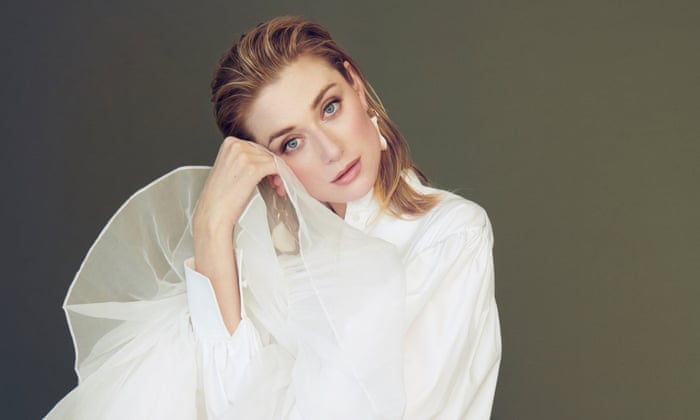
‘Actors have good coping mechanisms’: Elizabeth Debicki wears dress and earrings by Valentino. Photograph: Gustavo Papeleo
Interview
Elizabeth Debicki: ‘I’m not interested in being comfortable’
Elizabeth Debicki had us all enthralled in The Night Manager (including Le Carré himself). Now she’s back in a new spy thriller. And, despite her 6ft 3in height and A-list pals, she’s still the down-to-earth girl from Melbourne…
Sophie Heawo
Sunday 12 July 2020
T
o have everybody on the planet in their own homes, not able to see their friends, and collectively yearning for something – I think it’s very interesting for our species,” says the Australian actor Elizabeth Debicki, who is speaking to me in a slow, low voice over the phone from her house in Los Angeles. She has something of an other-worldly manner, part of what makes her so compelling on screen, and says she is in the garden, where she has “never spent so much time staring at lavender plants before. Brain restructuring itself.”
It is the early part of lockdown, before America’s cases of coronavirus start making it the worst-hit country in the world, and we were supposed to be meeting in the flesh to discuss her new film, Tenet, the much-hyped thriller from Christopher Nolan, who made Dunkirk, Interstellar and various Batmans, and which also stars Robert Pattinson, Michael Caine and Kenneth Branagh. But it has been held back until August, when we might be able to watch the 3D World War Three spy thriller in cinemas.
Wild as the project sounds, the experience of shooting it was an unexpected kind of preparation for the isolation of lockdown, explains Debicki, because much of her time was spent “living in an apartment in Estonia for months, a hotel in Bulgaria, not seeing anyone from my real life. So maybe, in a funny way, I’ve been a little bit in training for this for a while. I’ve spoken to a few actor friends of mine about this – perhaps we already have coping mechanisms for being away from our lives.”
Debicki’s previous film roles include Ayesha in the Marvel film Guardians of the Galaxy Vol 2 (she will return for the third instalment); the hilariously forbidding villain in Guy Ritchie’s The Man from UNCLE; and playing Virginia Woolf in Vita and Virginia, but as for her part in Tenet, “It’s really tricky, I sort of can’t… I can’t really tell you anything about it,” she says. “I wish I could tell you more, but I can’t, and I’m sworn to secrecy.”
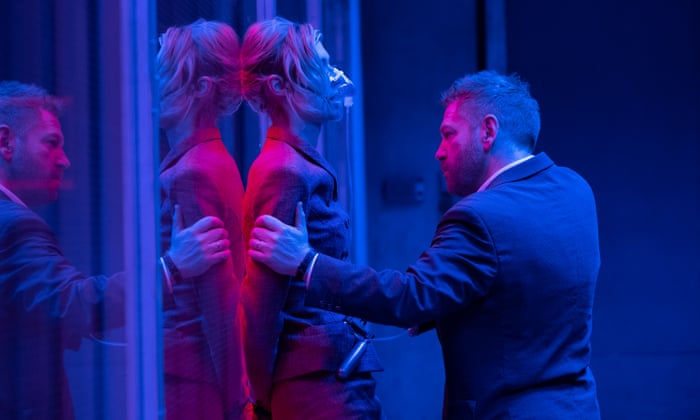 |
| Moody blues: with Kenneth Branagh in Tenet. |
She can, however, discuss the brilliant BBC drama series The Night Manager, based on the John le Carré novel, in which she co-starred, in 2016. It still comes back to me in flashes: Hugh Laurie playing an arms dealer and Debicki his girlfriend, Jed. (At 6ft 3in, she is taller than him, which only added to their beguiling power dynamic.) I tell her it had me on the edge of my seat for six weeks. She agrees that it was “a good TV show, I’m very proud of that. Also, it delivered me Hugh Laurie, which… What a gem. What a treasure of a friend!”
Yet the real treasure from that production, as well as seeing Laurie play a tricksy bastard and Tom Hiddleston crisply outwit him in turn, is what Debicki did with her part. What seemed, on paper, like a rather typically thinly sketched female character (young, blonde, a few lines and fewer clothes) became something altogether more powerful in her performance. I could not take my eyes off her eyes: where were they looking, what did they see? What did she know, and what was she trying not to know? Apparently I wasn’t alone in this – a certain Mr Le Carré had to hand it to her after watching the series that she had created a better character than he had.
“He said to me, after we’d finished making the show, ‘Oh, you made her so much more interesting than I did.’ He really meant it, and it was very generous of him to say that.” It was no accident: the show’s director, Susanne Bier, who won an Emmy for it, worked with Debicki on this. “It was our intention,” explains Debicki. “Because when people say, ‘I want to play a multi-dimensional woman,’ or ‘We need to give this character more dimension, she doesn’t have enough layers,’ what are they really saying? Usually they mean, does she have an opinion? Does she have an objective? Is she being idealised and commodified by not only the male characters, but also the lens?”
This is clearly something that increasingly matters to Debicki, at a moment in history when the film industry is waking up to its flimsy treatment of female roles. She says that the specific genre of crime spy thrillers, “usually does marginalise women. So how can we break those things, so that women have someone to watch in a show, so they think, ‘Wow, that’s authentic,’ and to some degree, ‘I can understand you?’ This interests me. I think that Susanne and I were just very aware that neither of us had any interest in creating anything that wasn’t really interesting for women to look at.”
Born in France, but raised mainly in Melbourne, Debicki was the child of professional dancers and an extremely studious school pupil who read voraciously, then did a drama degree at the University of Melbourne’s Victorian College of the Arts, where she won a bursary for outstanding students. As soon as she had graduated, Baz Luhrmann saw her showreel and cast her in his 2013 film of The Great Gatsby, based on the book she had loved since she was 15. He brought half of Hollywood to Australia to shoot the movie, in which she played Jordan Baker, the golf-playing socialite, aloof but gossipy best friend of Daisy Buchanan. It was a baptism of fire that would change Elizabeth Debicki’s life forever.
“I was such a baby when I made that movie. This is the first time I’ve ever really admitted that, but I was 20, and what did I know? I had just finished acting school, I only had the knowledge you get from your life, your own soul, and reading a lot. Not from experience. I just kind of jumped on that Baz machine. I had nothing to compare the scale of the movie to because I had never really made anything before. The size of it, the madness of it, the number of extras and the detail. To walk into a set where there are three storeys and stairs leading to nowhere, the Dali-esque madness of making New York in the 1920s in Sydney, Australia, with Baz Luhrmann! It was a wormhole, it was an alternate reality.”
Yet instead of being afraid, she was enraptured. “I basically had the best time possible,” she says. “Ignorance is bliss. If you have nothing to be afraid of yet, you haven’t built up even the thought mechanisms that allow you to kind of habitually fear this, or doubt your capacity to do that, because you’ve never tried to even do it before. I spent a lot of time watching people working, I was fascinated watching Leo [DiCaprio], I was fascinated watching Carey [Mulligan].”
What were you seeing?
“That Leo was maybe even more in a scene when he wasn’t even on camera – he really held the psychological space of the work for everybody. I really remember observing that and thinking, that’s so interesting. That’s really how you do it. He’s deeply generous as an actor and I was fascinated by it. Best masterclass ever.”
Meanwhile, someone would tell Debicki to go to her mark (the spot where you’re supposed to stand), “and I’d be like, what’s that for? I had zero camera craft. I had no idea. God bless the focus puller on that movie, I’m sure. I probably should buy him a bunch of flowers now.”
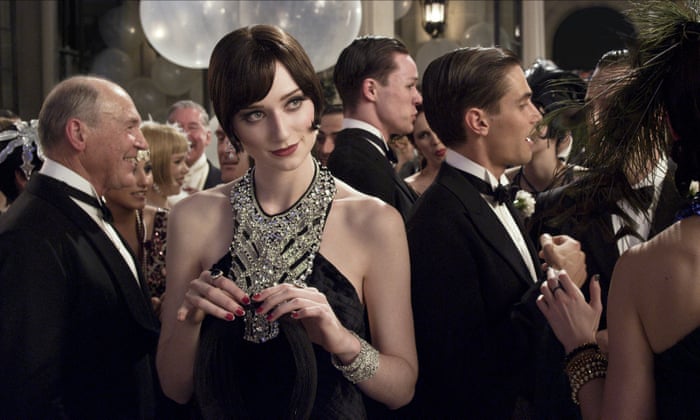 |
| ‘I was such a baby when I made that movie’: aged 20 in The Great Gatsby, her first major film. |
Despite this ascent towards the A-list, Debicki has resisted the siren song of social media, something which is unusual among newer recruits to Hollywood. Surely, now she’s stuck at home, it’s time to get engrossed in the mindless practice of scrolling through Instagram. She says nope – still not going there, “It’s kind of a foreign world to me, Instagram,” before admitting that she does sometimes log on to her sister’s account, and that she enjoyed watching Stanley Tucci making a Negroni and Meryl Streep’s Martini.
In fact, she had the app on her phone “for about a week, and it was like when you give your grandmother email or something, and she’s like, ‘Oh dear, what’s all this?’ I was like, ‘Oh my God, what is this whole world?’ But I can see why it is so addictive.”
She goes so far as to say that the experience gave her a “heightened psychological breakdown”, which is perhaps not strictly true, “but I have to say, I just find Instagram to be very overwhelming, because I personally feel like what it does to my brain – and probably all of us, I don’t know – I think comparative thinking is kind of the bane of female thinking. I know it happens to men a lot, but I think we women can be very comparative. It’s not like comparative thinking leading to one-upmanship, it’s comparative leading to us then being like, ‘Oh my God, what am I? Why do I bother?’ And I just don’t think that’s really healthy for me right now.”
I wonder if she finds more support in the group of fellow young Australian actors who are currently taking over Hollywood: Margot Robbie, Liam Hemsworth, Teresa Palmer. Do they see each other? Is it a scene? And is there an initiation ceremony where the Aussie elders such as Nicole Kidman, Russell Crowe and Hugh Jackman welcome them into the fold?
“Oh yeah,” she says, before making a droll joke. “Nicole rolls you in, Cate [Blanchett] covers you in goose feathers and then Guy Pearce hangs you out a window.”
I suspect there is not a scene.
“But there is support in a cultural sense, that we all know where we came from, in a way. You understand what your grassroots look like. Mine look different to whoever else, but I understand what you have fought against, or I understand the culture that you have either embraced or not. I understand what it means to one day pack your suitcase up and leave the thing that was familiar to you, and have to come to Los Angeles or wherever and do that rite of passage. I get that, because I’ve done it. I think that is common ground for us.”
She has worked with Cate Blanchett, “so when I see her it’s always such a pleasure, and I kind of know her more than I know some other people in that wave,” she says. As for other co-stars, if she hadn’t had enough experience of British national treasures, she also recently made a film called The Burnt Orange Heresy, in which Mick Jagger played an art dealer living in a villa on Lake Como. As she recounted on a chat show later, she and Jagger got to know each other and swapped numbers – in fact there is video footage online of him rushing to help fix her flowing dress at the premiere – and when he rang her, her sister was apparently startled to see the words “Mick Jagger calling” on Debicki’s phone, and realised how far this fame thing had taken her.
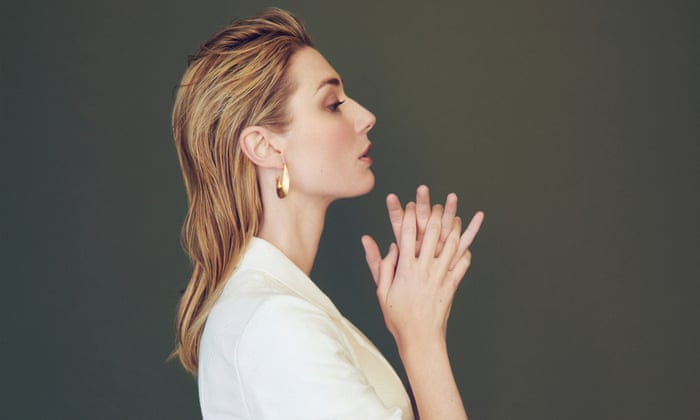 |
| ‘Women can be very comparative. And that’s not healthy for me now’: Elizabeth Debicki wears coat by Loewe (selfridges.com) and earrings by Alighieri. Photograph: Gustavo Papeleo |
Perhaps it’s hard to keep people fully updated if you come from Australia, where you must remain self- deprecating at all times.
“If you’re an actor, you mustn’t get any ideas about your craft. In Australia, you’re barely allowed to say this is a job. You’re supposed to be like, I don’t know, sometimes I just do this thing, the camera rolls, then like, I go home! You can’t own any of it, they’ll just knock you down. I think a lot of it is about making people comfortable, with no one being too ambitious, not too provocative or transgressive. I understand that makes for a pleasant drink at the pub, but I’m not really interested in being too comfortable.” She says that particularly talented Australians “often have to leave the pool and collect experience, collect people, and then come back to it. Or, they just sort of leave – and they don’t necessarily go back.”
She agrees that the Brits she has worked with have a strong line in this, too. “Oh they’re very self-deprecating, all of them. Yeah, it’s funny with your national treasures. I’ve never met Maggie Smith, I can’t imagine she’s self-deprecating, but the Hughs [Laurie] and the Olivias [Colman] and the Kens [Branagh] are all a bit, ‘Oh, we just turn up and do the scene,’ too.”
And these are people who have spent 20 years mastering the work.
“Yes, you’ve rewritten all the classics, and you can quote every line of Shakespeare ever written,” she says, presumably referring to Branagh. “It’s like Olivia. I love listening to her talk about her process – it sounds so vague, but it’s just this magic that Olivia does. She’ll be like chat, chat, chat, chat, chat, and then turn around and bang, just smash out this amazing thing.”
Yet Debicki insists that even experienced stars working at this high level still get scared.
“They get nervous before they go on stage, or they get nervous before they start a job or you’re in rehearsal, and the director leaves a room and everyone goes, ‘Do you know how to do this? I don’t know how to do this.’”
She relishes this horror. “There’s definitely a part of my mentality that looks for that discomfort. I look for the challenge. I get bored of my own impulses, I get bored of my own suggestions and I get bored of my own habits very quickly. I think I’m always kind of consciously and unconsciously looking for someone who’s going to call me on my shit.”
Tenet is released on 12 August
Photographer’s assistant Joe stone; produced by Lemonade productions; makeup by Mary Greenwell at Premier Hair & Makeup Using Shiseido Colour Cosmetics; hair by Peter Lux at the Wall Group Using Bumble & Bumble; styling by Bemi Shaw; styling assistant Lily McMurray; shot at Waddington Studio

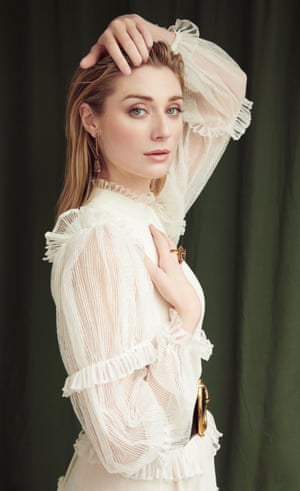


No comments:
Post a Comment